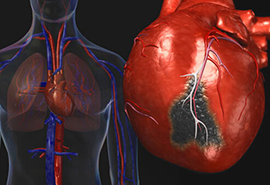


Heart disease (also called cardiovascular disease) is caused by narrowed or blocked blood vessels that prevent your heart from working properly and pumping effectively blood to all of your body's cells. This usually occurs if extra fat in your body sticks to the inside of your blood vessels, and then slowly builds up.
Cardiovascular disease symptoms may be different for men and women. Men are more likely to have chest pain; whereas women are more likely to have symptoms such as shortness of breath and extreme fatigue.
General symptoms include the following: